November 29, 2015
by Carole Zangari -
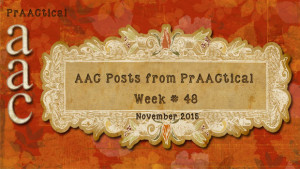
Monday – Building AAC Intervention Skills: Skillful Use of Time Delay Tuesday – How We Do It: Co-Teaching with PODD by Dana Brown and Sara Olsen Wednesday – Classroom Support for the Beginning Communicator Thursday – Happy Thanksgiving!
Filed under: PrAACtical Thinking
November 24, 2015
by Carole Zangari -
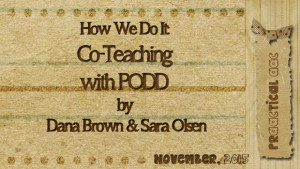
When SLPs and teachers work together for the benefit of students with little or no functional speech, the results can be magical. Today, we travel to Wisconsin to visit with SLP Dana Brown and Special Educator Sara Olsen who work together at the elementary school level. In this post, Dana and Sara tell us about their experiences using PODD in a classroom of students with intellectual disability. You can learn more about their work on YouTube (Watch Your Language) where they post Word of the Week videos and snippets of AAC use in different clasroom activities. Regular readers know that we’ve posted a few articles and videos on PODD. ::::::::::::::::::::::::::::::::::::::::: We write as a team of special educators, a Speech Language Pathologist (SLP) and an Intellectual Disabilities teacher, and one thing that we’ve learned working closely together is that AAC is difficult and ongoing. In this post, we are excited to share... [Read More...]
Filed under: PrAACtical Thinking
Tagged With: classroom, collaboration, Dana Brown, PODD, PODD book, Sara Olsen, schools
November 23, 2015
by Carole Zangari -
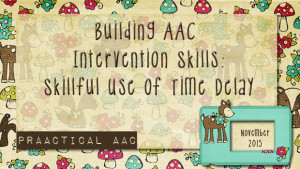
The effectiveness of AAC therapy is probably more related to the skill of the individual interventionist than it is to the therapist’s professional discipline. Whether our backgrounds are in SLP, special education, OT, or behaviorism, we all strive to further develop our skills in implementing AAC instruction. In today’s post, we invite you to join us on a journey of therapy skill-building. We start by learning more about two types of time delay, constant time delay and progressive time delay, both of which have are research-supported strategies for learners with ASD and other developmental disabilities. They are important tools for helping AAC learners generalize their communication skills across settings and minimize the possibility of prompt dependency. The team at Autism Focused Intervention Resources and Modules (AFIRM), a project of the National Professional Development Center on ASD at the Frank Graham Porter Child Development Institute at the University of North Carolina... [Read More...]
Filed under: PrAACtical Thinking
Tagged With: AFIRM, Frank Graham Porter Child Development Institute, intervention, intervention skills, National Professional Development Center on ASD, time delay
November 22, 2015
by Carole Zangari -
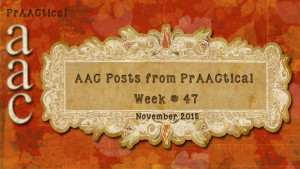
Monday – Tracking Natural Speech Changes in AAC: PrAACtical Suggestions Tuesday – Presentation Handouts on AAC Implementation Wednesday – Video of the Week: Family Collaboration by Dr. Barry Prizant Thursday – PrAACtically Reading with Karen Natoci: I Eat Thanksgiving Dinner
Filed under: PrAACtical Thinking
November 19, 2015
by Carole Zangari -

Here in the US, many are getting ready for the Thanksgiving holiday. If you’re looking for a way to add a prAACtical dimension to your preparations, this post is for you. Thank you, Karen Natoci, for another fabulous PrAACtically Reading contribution! :::::::::::::::::::::::::::::::::::::::::::::::::::::::::::::::::::::::::::::::::::::::::::::: Book: I Eat Thanksgiving Dinner by Karen Natoci; Published on Tarheel Reader here. Core Vocabulary focus: LIKE, DON’T LIKE, Uh Oh!, I, MORE, IT, COMMUNICATION Matrix Level: I-VII Literacy Framework: Emergent This month, we decided to practice eating Thanksgiving Dinner by “eating” our way through this book! This has been uploaded to Tarheelreader and the powerpoint version is available there. This is shared around a table set for a feast! To prepare for this story, we were able to purchase a frozen thanksgiving dinner available at the grocery store. We heated it up and separated it into serving dishes, individualized according to the diet of each of our readers. Some... [Read More...]
Filed under: PrAACtical Thinking
Tagged With: download, Karen Natoci, literacy, PrAACtically Reading, Thanksgiving
November 17, 2015
by Carole Zangari -
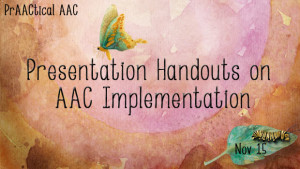
It’s hard to get to every conference where high-quality information on AAC implementation is being shared. Here are some handouts on AAC implementation from presentations you may have missed. Models of Parent-implemented AAC Intervention for Children with Severe Autism (Wendt, et al 2014) AAC in the Pediatric ICU/Acute Care: Preparing a Child for an Upcoming Hospital Admission (Santiago, 2013) Teaching Preschoolers with Unintelligible Speech to Produce Rule-Based Sentences: AAC Solutions (Binger, 2014) Supporting Beginning Storytellers Who Use AAC (McLellan, 2014) Strategies for SLPs Working with Students with AAC Needs in Schools (Phillips, 2014)
Filed under: PrAACtical Thinking
Tagged With: handout
November 16, 2015
by Carole Zangari -
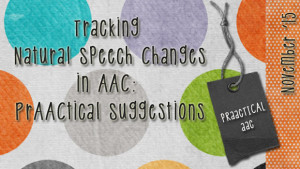
Let’s face it: No matter how much some of us love the AAC field, nothing makes us happier than hearing the natural speech of our prAACtical friends. Initially, it’s a good idea to capture the oral output of our AAC learners so that what we have a baseline of their productions. That can serve as a point of comparison later on when we want to look at how the student is changing over time. Didn’t do a baseline measure at the start of treatment or the school year? It’s nothing to stress about, but put this on your radar and consider gathering the information now so that you have it to work with later on. Here are some thoughts on moving forward. What to Track Track the sounds your student can produce: Complete a phonetic inventory by keeping a list of all the consonants and vowels the AAC learner has produced.... [Read More...]
Filed under: PrAACtical Thinking
Tagged With: data collection, natural speech, Padlet, phonetic inventory
November 15, 2015
by Carole Zangari -
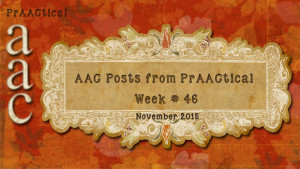
It’s a busy week for AAC, with dozens of presentations on AAC and related topics at the annual ASHA convention. Here are some posts from our prAACtical week. Monday – How We Do It: A Classroom Journey with PODD by Rachael Langley Tuesday – On Full Sentences and Questions in AAC Systems Wednesday – Video of the Week: AAC Implementation with Children by Kate Ahern Friday – AAC Handouts from ASHA 2015
Filed under: PrAACtical Thinking
November 13, 2015
by Carole Zangari -
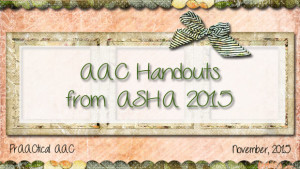
Traveling to conferences to hear about new developments in AAC is always re-energizing. Here are some of the handouts from ASHA’s 2015 Convention in Denver. (FYI – There is an alternate link at the bottom if you have trouble accessing individual handouts.) AAC for the Generalist: When, Where, & What to Explore by Lisa Martin and Meghan Shank Getting to the Core of Core Vocabulary: AAC Implementation Strategies for Caregivers & SLPs by Sara Barnhill, Meghan Danowski, and Barbara Lent Outcomes of AAC Acquisition in Pediatric Intensive Speech Model: A Case Study by Heather McDaniel and Teresa Ankney Using Client Interests to Facilitate Success in AAC & Intervention by Bethany Diener Progress Monitoring Strategies for Children With Complex Communication Needs Who Use AAC by Janet Dodd Please note that downloads of ASHA Conference handouts may only be available for a limited time. If you are unable to access the links, you... [Read More...]
Filed under: PrAACtical Thinking
Tagged With: ASHA 2015, handouts
November 10, 2015
by Carole Zangari -
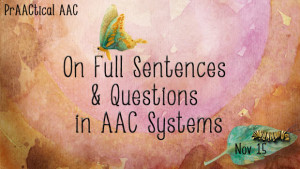
A few years ago, we wrote about the role that prestored messages can play (you can see that post here). We discussed the need to provide AAC learners with quick ways to communicate emergency messages, ask questions, and participate in predictable routines, among other things. For linguistically competent users of AAC, having access to phrases and full sentences may not be life-changing but it can cut down on fatigue or speed up conversations. For other AAC learners, however, prestored messages play a much more important role. People with significant access issues, for example, can quickly become exhausted trying to select words and put them together into sentences. Early on, they learn to evaluate interactions in terms of whether the communicative situation merits the physical and mental energy needed to construct a full response. Often, they opt out, not because they are willful or lazy but rather as an energy conservation... [Read More...]
Filed under: PrAACtical Thinking
Tagged With: prestored message, prestored sentence








